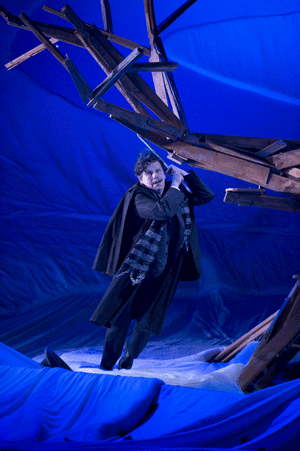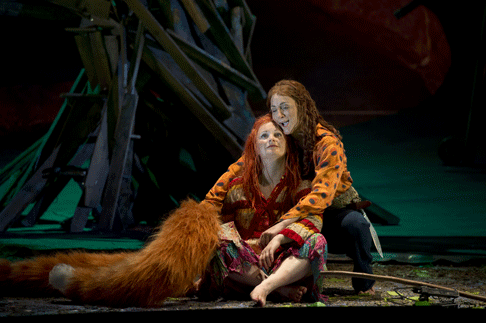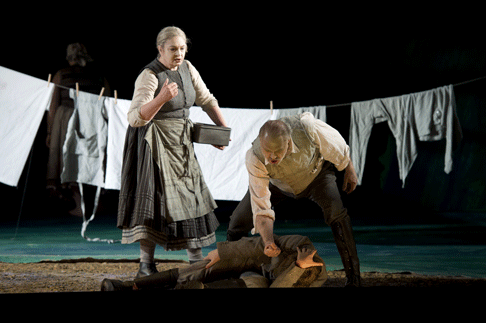30 May 2012
Glyndebourne Janáček The Cunning Little Vixen
Glyndebourne’s 2012 season started in great style with Leoš Janáček’s The Cunning Little Vixen. Its rapturous reception would suggest that this could become a Glyndebourne perennial.

Glyndebourne’s 2012 season started in great style with Leoš Janáček’s The Cunning Little Vixen. Its rapturous reception would suggest that this could become a Glyndebourne perennial.
Inspired by a novella illustrated by cartoons, the story of Vixen Sharp Ears has great charm. The production glows with gorgeous colours, on stage and in the pit. Vladimir Jurowski conducts the London Philharmonic Orchestra with lustrous style: you can hear the “birds” in the score, feel the sunshine and thrill to the starlit night sky in the final scene.
 Adrian Thompson as The Schoolmaster
Adrian Thompson as The Schoolmaster
The Cunning Little Vixen is about nature, but it’s not naturalistic. Janáček observed nature closely, but doesn’t write about animals so much as about human nature. Thus the intense gemstone colours of Tom Pye’s designs dazzle gloriously. Like the World Ash Tree in Wagner’s Ring, a huge construction looms over the stage. It’s a tree which changes with the seasons : spring blossom, autumn golds, bare winter branches. Since one of the themes in this opera is the passing of time, the tree is a natural metaphor. There’s a slide behind it from which animals pop up and observe. Later, it’s shown as the lair in which the foxes live. This vividness reflects Jurowski’s approach to the music. Although Jurowski softens the sharper edges of Janáček’s idiom, he creates surges so lush that he brings out the vigorous life force that’s fundamental to the meaning of this opera. The Vixen dies, the Forester grows old, but nature renews itself each year, and the grandchildren of foxes and frogs continue the cycle of life.
“Kontrapunkte, Kontrapunkte”, the Forester (Sergei Leiferkus) tells the Schoolmaster (Adrian Thompson) He’s explaining that the dry old schoolmaster’s not right for a woman like Terinka. It’s a wry joke, not something a woodsman would say, but a composer might. Perhaps Janáček identified with the Schoolmaster, withering away without love. Significantly, he found new creative momentum in old age, when he met Camila Stösslová. Janáček is quite explicit about what makes the sap rise in human beings. “How many children do we have, dear?” asks the Fox of the Vixen. “We’ll make many more”.
 Lucy Crowe as Vixen Sharp Ears and Emma Bell as Fox
Lucy Crowe as Vixen Sharp Ears and Emma Bell as Fox
In this production, one of the finest scenes is the one where the Fox (Emma Bell) courts the Vixen (Lucy Crowe), just as a formal, old-fashioned formal couple might have done in Janáček’s youth. “May I call upon you?” he asks, and she responds coyly. Very decorous. Animals don’t beat around the bush like that. Janáček then becomes even more daring. “Do you smoke?” asks the Fox. Is the Vixen A Modern Woman, emacipated like Stösslová, and not domesticated like Zdenka, the composer’s wife? The Vixen lives independently (in a treehouse inherited from “Uncle Badger” (Mischa Schelomianski). “My ideal woman!” cries the Fox. There are cryptic personal meanings in The Cunning Little Vixen which can easily be missed. Please see my piece “Janáček, Cunning Vixen and Subversion”. The scene isn’t heavily scored, so the words carry weight and Jurowski lets them be heard clearly, Then, when the mood shifts, orchestral textures become more dense, even sinister. Listen for the triumphant finale, which could be sheer Hollywood (though it was written long before film had sound). As life ebbs from the Forester’s body, his spirit breaks free. You can imagine Janáček joyfully defying convention. The Forester doesn’t die with “The Old Woman”, his wife (Jean Rigby) but with the spirit of the Vixen and her wild ways.
Sergei Leiferkus’s Forester is outstanding, created with real vigour. He’s of course an extremely experienced singer, but he’s also a strong actor with a wonderful sense of humour. He does Shostakovich satires with panache. In 2010, he sang Edward German’s Who were the Yeomen of England at the reconstruction of a 1910 Prom. He sang with a heavy accent, but with such glee that it felt more sincere than any dour, irony-free performance. Adrian Thomnpson, as the Schoolmaster/Mosquito, was sadly underused. He can sing Czech better than most Englishmen, and has done a lot of Janáček. He deserves a higher profile. Lucy Crowe as The Vixen was clear. pert and spirited, as a good Vixen should be.
This Glyndebourne Cunning Little Vixen is great entertainment, and orchestrally rewarding. It’s let down, however, by direction that’s less incisive. While Janáček defines the roles vividly, Melly Still turns characters into caricatures. Dressing humans as animals is almost as tricky as dressing animals as humans. From time to time, the cast move like animals, but that’s not enough. The focus should be on who the animals really represent. Partly the problem lies in the costumes (Dinah Collin) which make it hard to realise who’s who unless you’ve read the synopsis.
 Sergei Leiferkus as The Forester and Jean Rigby as his wife
Sergei Leiferkus as The Forester and Jean Rigby as his wife
But the bigger problem is that the parts are given no personality. The weakest scene in this production occurs in the hen coop where the Vixen tries to get the chickens to rebel against male dominance. It can be literally “red of claw and tooth” because the Vixen tears the Cock apart. Here, though, it’s so tame you could miss it among the busy babble going round the stage. The dancers are nice, but they don’t add much. Yet the Cock, Hens and The Dog are all crucial to the deeper meaning of this opera. Even the Vixen isn’t well developed. When the Vixen discovers the mystery of sex, poor Lucy Crowe pushes up her blouse in an unsubtle attempt to look “sexy”. Yet what Janáček has been telling us all along is that nature is instinct, not appearance, and that instincts win. When these darker, more radical aspects of the opera aren’t defined, The Cunning Little Vixen loses its bite. And what is a Vixen without fangs?
This production will be broadcast online on 10th June. On film, it might be a better experience. A film director could focus on essentials, and give the characters more definition than the stage director.
For more details, please visit the Glyndebourne website.
Anne Ozorio